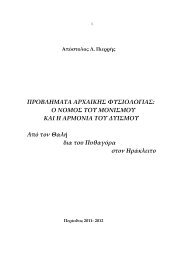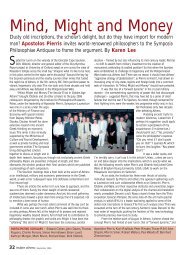38[39] It can be shown that <strong>the</strong>re cannot be more than <strong>on</strong>e absolutely simplereality. For if <strong>the</strong>re were, <strong>the</strong>y would have to be totally and absolutely unc<strong>on</strong>nected .For if <strong>the</strong>y entertained any communi<strong>on</strong> at all, if <strong>the</strong>y had anything in comm<strong>on</strong>, <strong>the</strong>nthat would be isolabl e as a moment in <strong>the</strong>ir natures, since it could not exhaust <strong>the</strong>entirety <strong>of</strong> <strong>the</strong>ir nature, o<strong>the</strong>rwise <strong>the</strong>y would coalesce into <strong>on</strong>e and <strong>the</strong> same entityand <strong>the</strong>y could not be more than <strong>on</strong>e. But <strong>the</strong>n, with an identifiable comp<strong>on</strong>ent in<strong>the</strong>ir nature, <strong>the</strong>y could be no more absolutely simple. And for <strong>the</strong> absurdity <strong>of</strong>c<strong>on</strong>ceiving <strong>of</strong> <strong>the</strong>m as entirely disc<strong>on</strong>nected, see following note. Far<strong>the</strong>r, arguing aposteriori, it can be shown that <strong>the</strong>re is just <strong>on</strong>e absolutely simple reality, <strong>the</strong> One.[40] If reality is going to have even <strong>the</strong> weakest and minimal coherence andc<strong>on</strong>nectedness, if realities are going to entertain some sort <strong>of</strong> communi<strong>on</strong> <strong>on</strong>e withano<strong>the</strong>r, <strong>the</strong>n <strong>the</strong> Ultimate Principle must be <strong>on</strong>e single reality; o<strong>the</strong>rwise we wouldbe able to c<strong>on</strong>ceive <strong>of</strong> two (or more) absolute ly desevered and totally unc<strong>on</strong>nectedUniverses – not merely spatially separated (like, say, Epicurean Worlds) or temporallydistinct (like, say, Stoic Worlds), but with absolutely no comm<strong>on</strong> feature, let it beabstract (like “being”, or “<strong>on</strong>e”, or “identical”) whatsoever.This view is indicated by Proclus, in Theologia Plat<strong>on</strong>ica II 2 p. 15.10-14and sqq. ed. Westerink and Saffrey. And see, <strong>on</strong> this subject in general <strong>the</strong> three firstchapters <strong>of</strong> <strong>the</strong> sec<strong>on</strong>d book <strong>of</strong> that work.For Proclus <strong>the</strong>re is ano<strong>the</strong>r, less abstract, line <strong>of</strong> pro<strong>of</strong> <strong>of</strong> M<strong>on</strong>ism, c<strong>on</strong>sisting,mainly, in our actually seeing that anything whatsoever, being or n<strong>on</strong>-being inwhatever way and mode, does have in fact something in comm<strong>on</strong> with anythingelse – namely that i t is <strong>on</strong>e. This is what is presupposed in particular in <strong>the</strong>development in Ch. 3 <strong>of</strong> <strong>the</strong> menti<strong>on</strong>ed sec<strong>on</strong>d book.[41] V. e.g. 4.14. But v. 71.23 where <strong>the</strong> παντελὴς ἀδιάκριτος αἰτία is <strong>the</strong> One.[42] Not really “something”, as we shall see![43] It is <strong>on</strong>e <strong>of</strong> t he pr<strong>of</strong>oundest thoughts in Metaphysics, and it is D. ’s own,that in a certain sense, yes, <strong>the</strong>re must be an absolute Nothing at <strong>the</strong> absolutecommencement <strong>of</strong> Reality, as <strong>the</strong>re is at its end. See what is so<strong>on</strong> to follow.[44] In catachrestic use.[45] This is <strong>the</strong> sense <strong>of</strong> διὰ τὸ κύκλῳ 5.10. The force <strong>of</strong> <strong>the</strong> argument relies<strong>on</strong> our keeping in mind that we have to do with undifferentiated πολλά qua πολλά;so if <strong>the</strong>y can be cause <strong>of</strong> <strong>on</strong>e ano<strong>the</strong>r, <strong>the</strong>re is no sufficient reas<strong>on</strong> that this would
39not apply universally to <strong>the</strong>m, i.e., that each <strong>on</strong>e <strong>of</strong> <strong>the</strong>m should be a cause <strong>of</strong> anyo<strong>the</strong>r; and similarly <strong>the</strong>re is no sufficient reas<strong>on</strong> why any<strong>on</strong>e <strong>of</strong> <strong>the</strong>m in particularshould be such as every<strong>on</strong>e else depend ed <strong>on</strong> it without its depending <strong>on</strong> anythingelse. We must c<strong>on</strong>centrate <strong>on</strong> t he fact that any<strong>on</strong>e <strong>of</strong> <strong>the</strong>m is c<strong>on</strong>sidered merely aswhat goes in to make up <strong>the</strong> indiscriminate and indefinite plurality which <strong>the</strong> πολλὰ ᾗπολλὰ c<strong>on</strong>stitute.[46] Simplicius, who esteems D. highly (our Damascius, « ὁ ἡμέτεροςΔαμάσκιος» as he says , <strong>the</strong>y were colleagues during <strong>the</strong> last days <strong>of</strong> <strong>the</strong> Plat<strong>on</strong>icAcademy in A<strong>the</strong>ns, when Damascius was in fact <strong>the</strong> last head <strong>of</strong> <strong>the</strong> venerableinstituti<strong>on</strong>), emphasizes that, in <strong>the</strong> investigati<strong>on</strong> <strong>of</strong> <strong>the</strong> very difficult problem <strong>of</strong>τόπος, he wanted to find out <strong>the</strong> nature <strong>of</strong> τόπος ἐκ τῆς χρείας αὐτοῦ (e.g. In Phys.,625.3 Diels; and v. 5.6 χρῂζει, esp. 6.26-7!) – that is, from its role or functi<strong>on</strong> in <strong>the</strong>structured system <strong>of</strong> reality. So, we may infer that D. was particularly sensitive topoint out everywhere <strong>the</strong> pragmatic reas<strong>on</strong>, in a functi<strong>on</strong>alist acceptati<strong>on</strong>, why weare impelled to posit this or that principle, this or that reality.[47] It is crucially important that this should be clearly seen, in view <strong>of</strong> <strong>the</strong> factthat D. (like his great predecessor, Iamblichus) accepted all k inds <strong>of</strong> mysteries. Atlast we must sharply distinguish between mystic and mystery.[48] This is <strong>the</strong> c<strong>on</strong>stant Aristotle’s injuncti<strong>on</strong>, not comm<strong>on</strong>ly taken sufficientlyinto account by his modern interpreters. Cf. Met aphysica Z , 2 ad fin. Cf. Physica184a16 sqq.; Ethica Nicomachea 1095b3.[49] It is interesting to see how “Herennius” put this passage: ἀλλ᾿ ὅμως ἐκ τῶν ἡμῖν γνωριμωτέρων, +ἀνερεθίον+ (sic; an ἀνερυτέον?) τὰς ἐν ἡμῖν ἀρρήτουςὠδίνας εἰς τὴν ἄρρητον συναίσθησιν τῆς φανοτάτης (!) ἀληθείας· Mai p. 5 70.Ἀνερυτέον might perhaps be a variant <strong>on</strong> ἀνεθιστέον, with its moment <strong>of</strong> purifying(warding <strong>of</strong>f, and thus keeping <strong>the</strong> purity <strong>of</strong> something).[50] One may object that, <strong>on</strong> <strong>the</strong> c<strong>on</strong>trary, it is ra<strong>the</strong>r a pro<strong>of</strong> <strong>of</strong> real power tohave <strong>on</strong>e’s own when strugglingly immersed in a commoti<strong>on</strong>, esp. when <strong>on</strong>e is ableto subject it to his sway. But, firstly, in such a case, and to <strong>the</strong> extent that <strong>on</strong>esucceeds in subduing a field and rendering it subject to <strong>the</strong> power <strong>of</strong> <strong>on</strong>e ’s nature, tosuch an extent does <strong>on</strong>e raise <strong>on</strong>eself above <strong>the</strong> “c<strong>on</strong>quered” field . And, sec<strong>on</strong>dly,keeping alo<strong>of</strong> does not entail being inert, uncausative and unproductive – <strong>on</strong> <strong>the</strong>c<strong>on</strong>trary, it is a mark <strong>of</strong> impotence to be able to “govern” a field <strong>on</strong>ly mechanically by
- Page 2 and 3: 2GENERAL REMARKThe first section is
- Page 4 and 5: 4Four reasons are, in aporematic fa
- Page 6 and 7: 6ὐθύς, i.e. without any prior
- Page 8 and 9: 8ἀμερές). Thus nothing is mi
- Page 10 and 11: 10separate them. Basically, as Aris
- Page 12 and 13: 12produced by, it; the principle in
- Page 14 and 15: 14the fashion of its one-ness, i.e.
- Page 16 and 17: 16[36] it may be. Now the def inite
- Page 18 and 19: 18found, and (there found) in accor
- Page 20 and 21: 20in its elf (apart from the orderi
- Page 22 and 23: 22something whose immediate product
- Page 24 and 25: 24clearer, as the system is further
- Page 26 and 27: 26ἡνωμένον, which generate
- Page 28 and 29: 28We find in this here a good insta
- Page 30 and 31: 30fully see his point, and to take,
- Page 32 and 33: 32NOTES[1] Not quite “given” th
- Page 34 and 35: 34forget that, for the time being,
- Page 36 and 37: 36[28] The interpretation given to
- Page 40 and 41: 40being immersed in it, handling it










